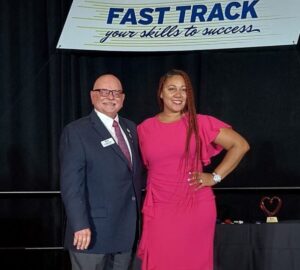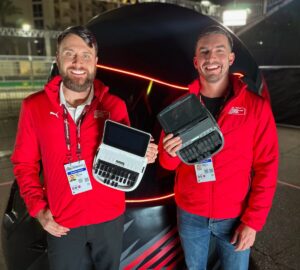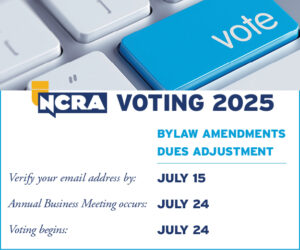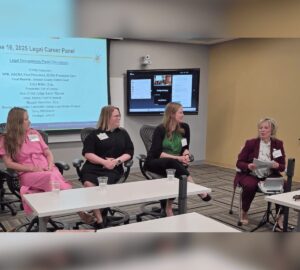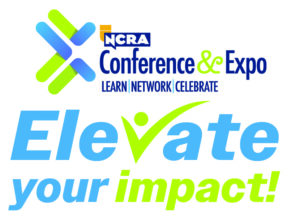By Dom Tursi
It began as a whispered conversation. Noah Collin approached me as I was leaving the seminar and invited me to a small birthday party he was planning for his uncle, Bill Cohen.
WHO IS BILL COHEN?
Who is Bill Cohen, you ask? He is a reporter whose name should never be forgotten. He has been called the “Superman of Reporting.” The finest reporters of several generations revere him as one of the best ever.
This deserves to start with a description of the Cohen family. Collin, a rising CART provider, comes from a family of reporting greats. I shared an office with his grandfather – one of the gentlest people I ever met: Jerry Cohen. At one time a United Nations reporter, Jerry was very intelligent, a prolific writer, talented cartoonist, and one of our best reporters. I had also roomed with younger brother Arnold; Bill was next door. Their dad, admitted to the bar during the Great Depression, soon turned to teaching stenography. He taught Gregg Shorthand to these three sons and encouraged them to pursue verbatim reporting careers. Ephram, the oldest, who wrote Phonography (Pitman), developed arthritis and later became involved in military contracting. Jerry taught himself machine shorthand and urged his younger brothers to learn it. Each was highly accomplished, devoid of braggadocio, and eager to help anyone who asked. I speak from this perspective – one that few have been privileged to experience.
While in the U.S. Army in 1942, the twins were assigned to the Judge Advocate General’s office in Atlantic City, where they taught themselves stenotype. They increased their speed by dictating to each other one hour a day. [Translation: Self-taught!] Upon discharge, they joined the staff in Manila, where they reported the Japanese War Crimes Trials. When they returned to New York, they scored second and third (out of 800) on the 1949 Supreme Court test. This exam, about a naturopath who studied the saxophone and alto recorder for diversion, would become notorious as the most difficult New York court test ever given.
They entered the speed contest of the Associated Stenotypists of America, just to see how well they could do. Bill won. The next year, following a 29-year hiatus, NCRA resumed its speed contests. Arnold, angry with himself for not winning the ASA test, found a way to convert that into writing dynamism and became champion of that 1952 NCRA Speed Contest. In the process, he set a new record – one error on the literary. Bill’s competitive fervor was not defeated.
The next year became known as the “Amazing Twin Result.” In a feat never before or since duplicated, they had the identical number of errors on each take: three on the 220 literary, four on the 260 JC, and two on the 280 Q&A (actual errors not identical). The Cohen twins tied for first place with a 99.86 percent finish. Reigning champion Arnold, unbeaten, was ultimately awarded the trophy. Bill did not enter the 1954 contest, which Arnold then won, retiring the trophy. This marked the end of their head-to-head competition.
Bill was champion the subsequent three years and chaired the NCRA Speed Contest for the next 40 years. He also chaired New York State Speed Contests and administered NCRA certifications and many other tests. For years, his numerous seminars, writings, teachings, and committee work made artisans out of technicians.
His extraordinary dedication to our profession inspired Marvin Birnbaum to author a monograph entitled, “Working with Superman.” Against the backdrop of their busy workload at the federal court in New York, Marvin spoke of Bill’s humility, work ethic, dedication, and extraordinary energy. Bill, he told us, taught reporting students before court and on recesses – without charge – and gave daily practice to speed-test aspirants, several becoming champions. Another colleague, Martha Hess, wrote: Bill gives all of his attention and “the benefit of his genius” to colleagues; makes time to answer every question; stops what he’s doing to help with other’s transcripts, encourages everyone to perfect his craft – all while he produces the most pages, of the highest quality, and insists on taking the most difficult, excruciating assignments because “he finds them interesting.” In fact, when the fastest-speaking lawyer in New York was appointed to their federal bench, this talented reporting staff panicked. Not to worry: Bill voluntarily reported him – as a challenge!
Now, don’t get the wrong idea. Bill is not flawless. In fact I feel uniquely qualified to debunk that notion. First of all, he is only one-half of the famous Cohen twins, so he cannot take full credit for their accomplishments.
Bill also seems to have had difficulty keeping a job. You see, whereas Arnold remained on the same reporting staff for nearly 60 years, Bill worked in the New York City Municipal Court for only one year. Then, after a mere 24 years in the New York State Supreme Court, Bill left his brother flat and went to federal court. He stayed there 28 years, and since 2001 has tried his hand at freelance. Think of it: Bill failed at retirement several times!
THE PARTY
The party was to celebrate Bill’s 90th birthday. I received a cascade of emails from Woody Waga, asking me to help him make this a special tribute for this giant of our profession. Woody worked hard, and within days the list of attendees included former colleagues of Bill from his state and federal positions, quickly headlined by an assemblage of some of today’s reporting elite. It would become somewhat emotional and an event to remember, for each of us would come to realize that everyone at the table was in the presence of so much professional greatness, all saluting William Cohen – the man whose efforts and achievements motivated each and every one.
The party was shaping up: November 16, at celebrity favorite The Palm Restaurant in New York – a perfect place for our own celebrity. Woody did a fabulous job bringing together, in a matter of days, a proverbial Who’s Who of Reporterdom. Additional to Bill’s colleagues from state and federal days, present were NCRA President Nancy Varallo, New York State Court Reporting Association President Brenner-Gettleman and Past Presidents White and Beskin, H. Allen Benowitz from Florida, and J. Edward Varallo from Massachusetts. In a remarkable show of respect, flying in from Texas just for the luncheon and then leaving immediately at its conclusion was world record holder Mark Kislingbury. Speed champion Candace Braksick was about to depart from Kansas when her flight was canceled. More than thirty were there to honor this man who for seven decades has been the role model for so many.
Bill’s current students were among the many who spoke eloquently about his influence upon them, but perhaps the great Ed Varallo said it best. Ed reminisced about their first encounter. Bill had just graded an early test and immediately took an interest in him. Bill complimented and then critiqued Ed’s paper, encouraging Ed to become the best he could be. Bill encouraged in Ed the same thing he demanded of himself: excellence. This virtue, Ed confided, has guided him ever since.
Now in his 72nd year of reporting, few doubt that Bill’s writing abilities have diminished much. He still teaches. He attends seminars with his students to show them the way to true professionalism. It is rumored that Bill actually wrote New York State’s first realtime certification test last year – just for kicks! Some believe he still would be an admirable competitor. Just imagine: The first 90-year-old to become …. Nah!
Thank you, Bill, for all you have given us. Happy birthday. Hope to be present when you turn 100.
Dom Tursi is an official court reporter in Central Islip, N.Y., and the curator of the Gallery of Shorthand Reporting. He can be reached at domtursi@email.com.




